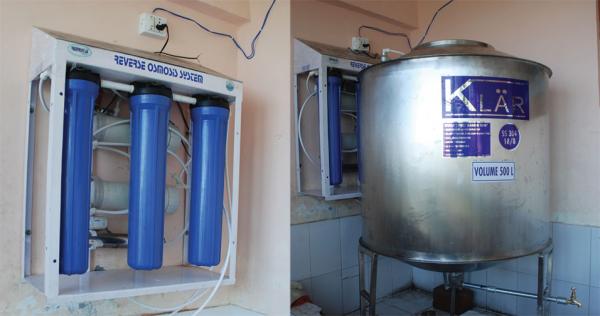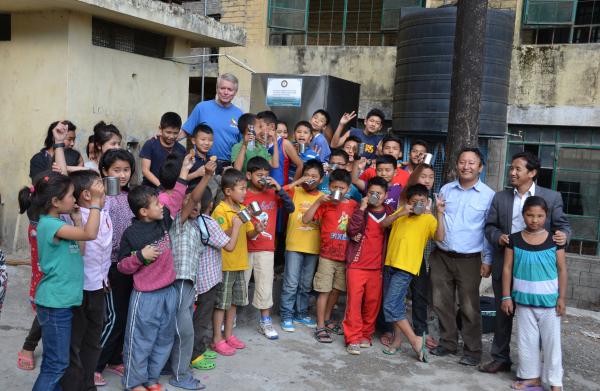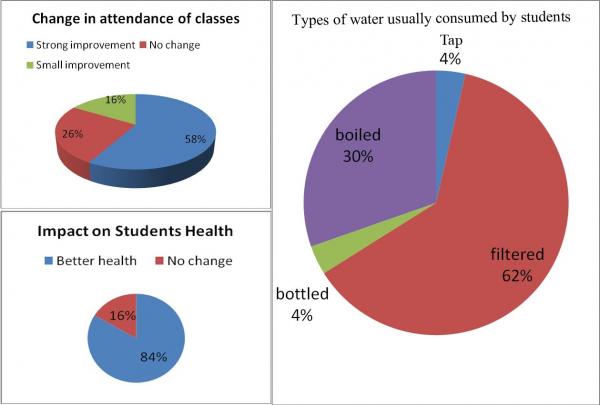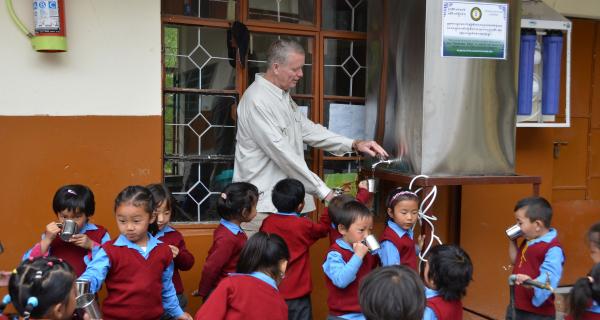Lha clean water project survey report
Background
Clean drinking water is an essential part in maintaining quality health among any population. Dharamsala's lack of filtered drinking water is significantly contributing to a rise in health problems in both the local Indian community and the Tibetan Refugee community alike. An inadequate drainage and septic system, leaking water pipes, water shortages and polluted drinking water all contribute to the decrease in health that the local community is facing. The most vulnerable members of society, those living below the poverty line, bare the biggest health burden.
To decrease the risk of water borne illness in the community, Lha has taken on a water filtration initiative in seven schools since 2010, six Tibetan schools and one Indian school. The filtration system uses a Reverse-osmosis, Activated Carbon and Ultra-violet process. The water filtration installation system includes a 500 liter stainless steel storage tank which acts as a reserve water supply in the event of a power outage or water shortage. The system is able to effectively filter 100 liters of water per hour. An additional 2086 students and approximately 200 staff are served by these filtration systems. Some of those students include those who board on school campus and thus they rely solely on the drinking water provided.

Survey Report
In autumn 2013, two environmental studies students volunteered with Lha to carry out a survey on the water filtration systems in all schools. The survey is used to see how the system has a direct impact on health and general awareness about contaminated water in the school communities, to check the systems efficiency and to assess the usage and acceptance of the system. This will allow us to identify areas for improvement in current and further installation.
The survey indicates a significant increase in student's health since the installation of the water filtration systems. With 84% of students and teachers agreeing that the system led to better health and only 16% agreeing that they did not see a change; there were no results indicating decrease in health. The increased health benefits of the water filtration system can also be seen through class attendance as 74% of students and teachers concluded that there is in fact an improvement in class attendance and thus fewer absences due to water borne illness.

Further education on drinking water safety is highly encouraged as the majority of survey respondents concluded that sediments and mud were the number one reason for water contamination (Figure 6). Education on bacteria and parasites may help to increase the awareness for the need to have fresh drinking water in order to help sustain quality health in a community.
Maintenance is essential for the sustainability of the water filtration systems. Thus, Lha has taken on the responsibility for the developmental sustainability of all of its current water filtration systems, all the while continuing to spread the message of safe drinking water for improved health by providing additional filtration systems to other schools.
To further this, there is a new job positing at Lha for a "Clean Water Project Manager." The employee will be responsible for managing health and hygiene education programs at varying locations (schools, monasteries, etc). The employee must stay in contact with the local Administration and Health Departments of the local Indian Government as well as the Central Tibetan Administration.

The water filtration project is highly valued and its ongoing success is necessary. We thank the Central Tibetan Administration for their recent letter of appreciation for the water filtration systems. We rely on the support of our donors and volunteers as a water filtration system instillation is around US $2 500. This includes a one year warranty, a water storage tank, the instillation fee and a water dispenser.
We sincerely appreciate all of your support in helping to making this great initiative possible!
Read 851 times















Lha's HIV/AIDS Awareness Talk
On 16th May 2014, the Lha Charitable Trust conducted an awareness talk on HIV/AIDS for the adult students of the Lha language classes. More than 40 students participated in the... read more
Lha's 13th Clean Water Project
Lha has successfully installed its 13th Reverse Osmosis (RO) Water Purification System as a part of its Clean Water Project on 13th May at Government College of Teachers Education in... read more
Lha's 12th Clean Water Project
Lha has successfully installed its 12th Reverse Osmosis (RO) Water Purification System as a part of its Clean Water Project on 6th May 2014 at Dawa Rinjue School Society, Herbertpu... read more
Lha's 11th Clean Water Project
Lha has successfully installed its 11th Reverse Osmosis (RO) Water Purification System as a part of its Clean Water Project on 6th May 2014 at Sambhota Tibetan School in Paonta... read more
Lha's 10th Clean Water Project
Lha has successfully installed its 10th Reverse Osmosis (RO) water purification system under its Clean Water Project. The RO system was installed at the Central School for Tibetans (CST) at Puruwala... read more
Lha's Clothing Distribution Project
On January 8, 2014 Lha delivered items of clothing through Dharamshala Rotary Club to Red Cross Society of Kangra District. The clothing was donated during 2013 by various members of... read more
Lha's Student Group from Mexico
The final student exchange group to visit Lha this year was a group of 21 students and teachers from the Instituto Tecnologico de Estudiios Superiores de Monterrey in Mexico. The group... read more
Lha's 9th Clean Water Project
On the 27th of November 2013 Lha Charitable trust has been able to install its 9th water filtration system at the Central School for Tibetans (CST) in Dalhousie at the... read more
French student exchange group
On October 8, Lha was pleased to organize yet another student group for its Cultural Exchange program. The group consist of 17 student accompanied by 4 teachers from Lycee de... read more
Tulane Student Exchange Group September 2013
On 9th September 2013, a group of 13 social work students from Tulane University School from New Orleans, USA, led by Dr. Ron Marks (Dean) and Dr. Carolyn Weaver, arrived... read more
Student exchange groups in July 2013
During July, Lha hosted three student groups, one from Rustic Pathways Inn and the other two from Lifeworks International. The Rustic Pathway group participated in the mutual learning program from... read more
Lha’s First Student Exchange Group in 2013
Lha's first cultural exchange student group of the year was from Tulane University in New Orleans, USA. The group, consisting of 12 students led by Mr. Michael Smith, arrived on... read more
Lha organized a creativity workshop at Petoen school
On Wednesday, June 12, Lha organized a creativity workshop at Gangkyi Petoen Day School taught by Lha's student exchange group from Tulane University in New Orleans, USA. More than 100... read more
Survey Report on Lha Community Soup Kitchen
On July 6th, 2011, Lha opened its Community Soup Kitchen in its new building, Ahimsa House. This became the first soup kitchen in Dharamsala that serves low-cost and nutritious meals... read more
Lha’s 8th clean water project at local Indian school
Moving a step further with the Lha clean water project, the Lha Charitable Trust in collaboration with the Rotary Club Dharamshala, successfully installed its 8th filter water system at the... read more
Lha’s 6th and 7th clean water project
Nearly twelve hundred Tibetan refugees provided with Safe Drinking water in the past ten days. Lha staff and volunteers recently returned from spending the weekend on 4th May 2013 in... read more
Lha's 15th and 16th Massage Course
Lha understands the growing number of unemployment challenges in our community. That is why one of our prime objectives is to give vocational training to local people so that they... read more
Lha Clean Water Project Update
On March 20, 2013, the volunteers and staff of Lha were thrilled to install our fifth institutional size drinking water filtration unit at a Tibetan school located just a few... read more
Exchange student group from Mexico
From December 7th to 30th of 2012, we hosted our last exchange student group in Dharamsala, visiting students from Instituto Tecnológico de Estudios Superiores de Monterrey Campus Santa Fe (ITESM... read more
Lha's fourth water filter installation
The Installation of a brand new filter water system was celebrated by the students of TCV Day School in McLeod Ganj on the 14th of November, coinciding with Children’s day. The... read more
Lha's Clear Vision project 2012
The gift of vision is something that enriches life and highlights the small pleasures of every day existence; Lha's eye care project-2012 was put into action in response to the... read more
Lha’s third Clean Water Project
On 18th October 2012, The children of Mewoen Tsuglak Petoen (model school*) School can finally reach turn on the tap and get clean drinking water now that representatives from Lha... read more
Students from Tulane University’s School of Social work.
Since 2002, Tulane University's social work students have been coming to India for a one month program in Dharmasala and its surrounding areas. This year, 16 students, 3 professors, and... read more
Lha Welcomes Three Cultural Exchange Groups in July
This month, Lha welcomed three cultural exchange groups to Dharamsala. In early July, a new group of 11 adults from Kentucky, led by Professor Ken Casey, joined Lha at Ahimsa... read more
- 1
- 2
- 3
- 4
Prev NextAbout Lha
Lha Charitable Trust is a grass-roots, 12AA & 80G non-profit and one of the largest Tibetan social work… read more
Lha Mission Statement
STATEMENT Lha is a resource of education and knowledge that provides meaningful, multi-leveled social and educational… read more
Lha History
Since 1959, Tibetans living in Tibet have been subject to the strict and repressive policies of the People's Republic… read more
Lha Partners
Louisiana Himalaya association Inc. (LHA) The Louisiana Himalaya Association Inc. (LHA) is a nonprofit, social service… read more
Lha Advisory Board
Jampa Tseri ng Jampa Tsering was the Founder of Lha Charitable Trust. He also co-founded LHA (Louisiana Himalaya… read more
Lha's Trust & Staff Member
Trust Chairman & Executive Director Mr. Ngawang Rabgyal was born in 1977. As a boy he studied Buddhist philosophy… read more